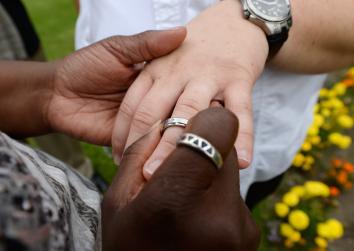In the months after the U.S. Supreme Court overturned DOMA, the gay marriage debate began to feel largely settled. A few more states started handing out marriage licenses to gay couples. The New Jersey Supreme Court struck down the state’s marriage ban, citing the high court’s DOMA decision. The New Mexico Supreme Court did the same, even daring the U.S. Supreme Court to go further next time. So when Federal District Judge Robert Shelby overturned a gay marriage ban in Utah last month, it seemed less like a hard-won triumph than a victory lap.
But as it turns out, reports of the Utah ban’s death have been greatly exaggerated. The first deeply red state to have gay marriage pushed upon it by judicial mandate, Utah has decided to fight back—and so far, it’s playing dirty. First, the attorney general pushed the 10th Circuit for a stay, hoping to halt the flood of gay marriages in the state. When he failed, he turned to the Supreme Court, which granted the stay and put marriage on pause until the state could appeal the case on the merits. With this taste of victory, Utah Gov. Gary Herbert formally invalidated the 1,300 marriages that occurred between Judge Shelby’s ruling and the court’s stay.
That rather sadistic move left more than 1,000 couples in legal limbo—until Friday, when the Department of Justice announced that the federal government would recognize those 1,300 marriages. This means that, for the time being, gay couples with a Utah marriage certificate are strangers in the eyes of Utah state law, and gay couples can no longer get married there—yet those already married are legally wed under federal law. Just a week ago, gay marriages in Utah were legal throughout the state. Now the state’s marriage laws have descended into quasi-anarchy.
Welcome to the next front in the gay rights battle: Call it the States Strike Back. At this stage, gay marriage advocates have plucked every low-hanging fruit in sight, culminating in the toppling of the monstrous DOMA. Those victories were monumental—but they were really only the beginning. With the basic constitutional premise of marriage equality affirmed by the court, judges in red states across America will now begin toppling the remaining bans on marriage equality. That’s likely what the court wanted when it handed down a half-measure like Windsor, tipping the first domino and letting federal judges do the legwork. But until the court decides to finish its work on the gay marriage front, we can expect a lot more Utah-style legal pandemonium.
Why is Windsor creating such a mess? Because a dissonance this vast between state and federal law is, in the scheme of things, simply unsustainable. The Framers of the Constitution grasped this problem when they added the Supremacy Clause to Article VI, holding federal law dominant over state law. But the problem here is subtler than a direct conflict between a state constitution and federal law. Windsor required the federal government to recognize valid same-sex marriages, but it didn’t compel states to perform them. As a result, a gay couple that marries in Massachusetts is still married when they move to Texas—but the union is recognized only by the federal government.
The Utah kerfuffle adds a layer of complexity. Massachusetts began recognizing gay marriages a decade ago and will probably do so forever. Utah recognized them for two weeks and held its nose the whole time. Now that the state is battling Judge Shelby’s ruling, it wants to unmarry 1,300 gay couples, declaring their licenses invalid. The federal government disagrees and has promised to provide those couples with all the federal benefits of marriage. Technically, Utah and the Department of Justice are only debating the validity of those 1,300 marriage licenses. But really, they’re fighting a proxy war over the limits on the federal government to recognize gay marriages in a state that voted overwhelmingly to ban them.
It’s a war that will reverberate throughout red state America over the next few years, as other more federal judges strike down state bans on the apparent command of Windsor. At the start of the decade, few observers anticipated gay marriage coming to Arkansas, Michigan, or even Virginia. But with lawsuits pending across the country, those states’ marriage bans are suddenly on thin ice. It’s tempting to declare them dead in the water, but as Utah illustrates, some states won’t let go of their homophobia without a fight. The post-DOMA celebration is over. And until the Supreme Court wades once more into the thicket, expect conservative states like Utah to buck against the federal government—using their gay citizens as hostages.
